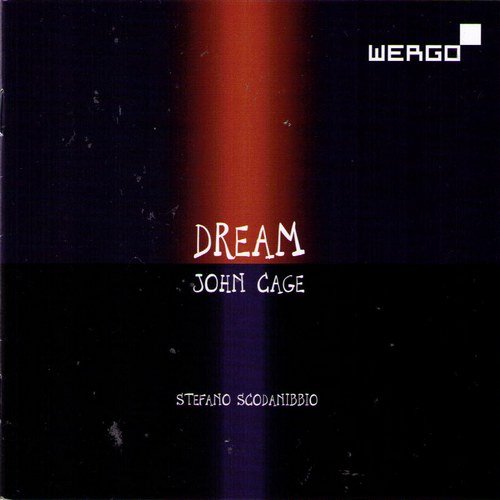
Stefano Scodanibbio - John Cage - Dream (2009)
BAND/ARTIST: Stefano Scodanibbio
- Title: John Cage - Dream
- Year Of Release: 2009
- Label: Wergo
- Genre: Avant-Garde
- Quality: APE (image+.cue,log,scans)
- Total Time: 01:05:43
- Total Size: 246 Mb
- WebSite: Album Preview
Tracklist:
John Cage / "Dream": Concert for piano & orchestra, Freeman Etudes, Dream, Ryoanji for contrabass and tape, Radio Music - Stefano Scodanibbio & Ensemble Nextime - 2009
01. Concert for piano & orchestra (1957-58)
02-06. Freeman Etudes, Nos. 1-5 (1977-1980)
07. Dream (1948)
08. Ryoanji (1985)
09. Radio Music (1956)
Performer:
Stefano Scodanibbio (contrabass)
Ensemble Nextime
Stefano Scodanibbio (conductor)
John Cage / "Dream": Concert for piano & orchestra, Freeman Etudes, Dream, Ryoanji for contrabass and tape, Radio Music - Stefano Scodanibbio & Ensemble Nextime - 2009
01. Concert for piano & orchestra (1957-58)
02-06. Freeman Etudes, Nos. 1-5 (1977-1980)
07. Dream (1948)
08. Ryoanji (1985)
09. Radio Music (1956)
Performer:
Stefano Scodanibbio (contrabass)
Ensemble Nextime
Stefano Scodanibbio (conductor)
John Cage did write some music for double bass, or at least pieces specific to a string instrument that can be played on double bass with authority, namely 59 1/2," for a string player (1953) and 26'1.1499," for a string player (1955); the latter piece being rather famously recorded for Nonesuch by Bertram Turetzky in the 1970s. In his Wergo release Dream: John Cage, double bassist Stefano Scodanibbio eschews these obvious Cage offerings for his instrument and elects to realize, or to adapt, other things in Cage's catalog with some splendid, and some mixed, results. The Concert for Piano and Orchestra (1958) is one of Cage's most widely adapted pieces; even solo parts taken from the score have been presented as separate Cage compositions. Scodanibbio's realization is like a version for solo piano and chamber orchestra that works very well; if it seems a little "Darmstadt-y, its that the texture, when thinned out to this extent, resembles a Darmstadt-styled chamber piece in a superficial sense, whereas full piano and orchestra realizations combine Cage's wispy instrumental elements in a far denser texture. Radio Music (1956) is also nicely realized and mixed into an appealing, three-dimensional ambience, though one wonders why Scodanibbio elects to use five performers instead of the eight Cage specifies. Ryoanji (1985) is heard in a solo version with tape, and the liner notes quote Cage himself as stating Scodanibbio's realization as "the best performance of Ryoanji I've heard"; it is impressive, though pace the composer the ideal situation for Ryoanji is the ensemble version in representing "the contours of the fifteen stones hosted by the Ryoanji Garden (in Kyoto)."
The first five Freeman Etudes (1980) are heard in transcriptions for double bass; they start off fine, but after a time the limited range of the double bass -- despite Scodanibbio's facility with it and his technique of "arco mobile" (so-named by Luigi Nono) -- begins to defeat the performance, as the ear starts to hunger for more variety of sound. The title track, Dream (1948), is a real puzzler. One would think given that the melodic line is all written in a moderately low register (the original is notated in C clef) that Scodanibbio would have played the whole piece himself, utilizing double stops to express the occasional chords in the piece. However, this is the typical piano version, played a tad too quickly by Fabrizio Ottaviucci and not taking full advantage of the numerous fermatas in the piece, with Scodanibbio contributing drones and other background elements, essentially providing harmony where there is none.
Cage's work opens up a seemingly endless universe of possibilities for performers, yet there are limits; sort of like a thinly delineated chalk circle out of which one must not try to step and Cage was well aware of this in his own lifetime. While there is a lot to praise on Stefano Scodanibbio's Wergo offering Dream: John Cage -- and it is moreover beautifully recorded -- the fact that Scodanibbio steps furthest out on the piece that is most clearly described and conventional in form is going to be something of a problem for diehard Cageans, and perhaps others.
The first five Freeman Etudes (1980) are heard in transcriptions for double bass; they start off fine, but after a time the limited range of the double bass -- despite Scodanibbio's facility with it and his technique of "arco mobile" (so-named by Luigi Nono) -- begins to defeat the performance, as the ear starts to hunger for more variety of sound. The title track, Dream (1948), is a real puzzler. One would think given that the melodic line is all written in a moderately low register (the original is notated in C clef) that Scodanibbio would have played the whole piece himself, utilizing double stops to express the occasional chords in the piece. However, this is the typical piano version, played a tad too quickly by Fabrizio Ottaviucci and not taking full advantage of the numerous fermatas in the piece, with Scodanibbio contributing drones and other background elements, essentially providing harmony where there is none.
Cage's work opens up a seemingly endless universe of possibilities for performers, yet there are limits; sort of like a thinly delineated chalk circle out of which one must not try to step and Cage was well aware of this in his own lifetime. While there is a lot to praise on Stefano Scodanibbio's Wergo offering Dream: John Cage -- and it is moreover beautifully recorded -- the fact that Scodanibbio steps furthest out on the piece that is most clearly described and conventional in form is going to be something of a problem for diehard Cageans, and perhaps others.
Classical | FLAC / APE | CD-Rip
As a ISRA.CLOUD's PREMIUM member you will have the following benefits:
- Unlimited high speed downloads
- Download directly without waiting time
- Unlimited parallel downloads
- Support for download accelerators
- No advertising
- Resume broken downloads


